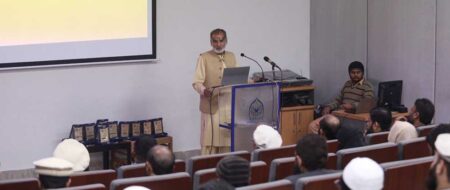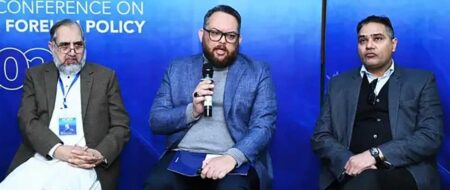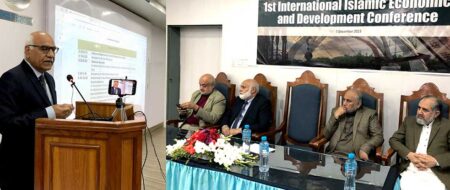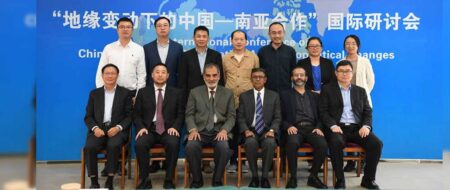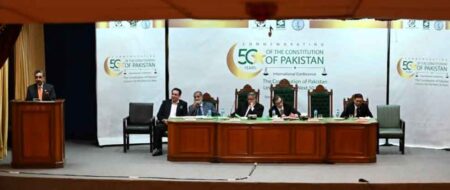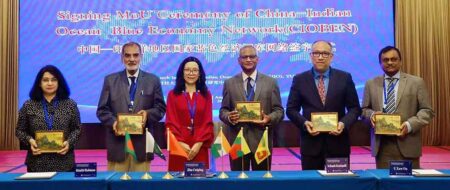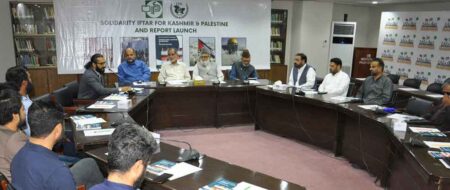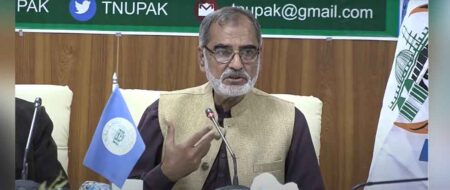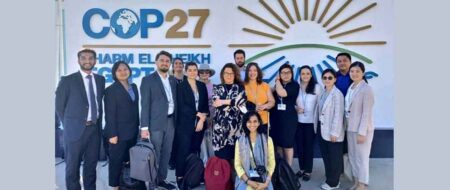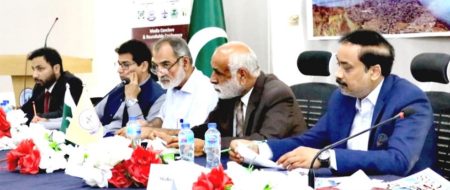Conference on Alternative & Renewable Energy concludes with recommendations to achieve energy security & conservation
A conference on Alternative and Renewable Energy (ARE) on 13 & 15 October 2012 titled “Towards an Energy Secure Pakistan” held at Jinnah Convention Centre under the auspices of Renewable Energy Association of Pakistan (REAP), Tawanai program of Institute of Policy Studies (IPS)
A conference on Alternative and Renewable Energy (ARE) on 13 & 15 October 2012 titled “Towards an Energy Secure Pakistan” held at Jinnah Convention Centre under the auspices of Renewable Energy Association of Pakistan (REAP), Tawanai program of Institute of Policy Studies (IPS), and Alternative Energy Development Board (AEDB) concluded with a set recommendations for the governments, financial institutions, business and industry as well as common man, to achieve the objective of energy security particularly vis-à-vis AREs and conservation.
The inaugural session of the Conference was held on 13 October and was themed ‘Deployment of Alternative and Renewable Energy Technologies in Pakistan – Opportunities, Obstacles & Way Forward’.

The session was addressed by Arif Alauddin, CEO, AEDB, Khalid Rahman, DG-IPS, Asif Jah, chairman, Islamabad chapter of REAP, Farrukh Mahmood Mian, Manager, Energy & ICT Division, Islamic Development Bank (IDB), Saudi Arabia along with a number of experts on ARE technologies such as biogas, solar, micro hydel, biomas, wind, etc.
The participants discussed various opportunities and available ARE technologies that have rich potential to meet the increasing demand of energy in Pakistan and urged the government to provide an enabling environment to attract FDI and facilitate and encourage the local manufacturers and help them get adequate financing and latest technology to develop reliable and economically viable solutions on a large scale for the consumers.
Along with importing ARE technology equipment, participants were also presented with projects based on indigenous technologies, i.e., biogas and mini-micro hydel. These technologies were described to have potential for transforming the rural economy. Similarly, bio-fuel was presented as another area with opportunities to utilize our vast marginalized land and potential to produce fuel and thus reducing our soaring oil import bill.
 |
 |
General participants offering their suggestions in the round table stressed upon the need to streamline clearance of imported products free from duties, promotion of ARE resources through demonstration projects, legal mechanism for introduction of net metering enabling home-based ARE systems to sell their surplus power to the grid (discos), technology transfer, trainings and capacity building in installation and maintenance of ARE technologies and upgradation of technologies developed indigenously like mini and micro hydel and bio-gas for commercial applications.
Arif Alauddin while concluding the first session remarked that one should not compare Pakistan with countries like US, Canada, Germany or even India, which were providing subsidies to the extent of US$0.50 to US$0.70 per unit to the consumers. He informed that India had allocated US$18bn to provide subsidies on electricity to its people, adding that we have to discuss implementable solutions to meet the energy crisis.
He further informed that the Asian Development Bank (ADB) offer to the government of Pakistan to obtain up to US$500mn through multiannual financial framework (MFF) facility for renewable energy projects in the public sector was being utilized through setting up of 10 micro hydel projects across Punjab worth US$140mn initially and other projects were also being planned to utilize the remaining amount allocated under the MFF.
The second session of the conference was themed ‘Energy Conservation & Efficiency: Small Steps, Big Impacts’ and was chaired by Masud Daher, former federal secretary and chairman of the National Tariffs Commission and was addressed by Asif Jah, president REAP (Islamabad), Dr Rania Ahsan, DG, Board of Investment (BoI), Dr Asghari Bano, dean faculty of biological sciences, Quaid-i-Azam University and a number of ARE experts and representatives of the industry and academia.
The third and concluding session was titled ‘Mainstreaming Policies and Actions’ and chaired by Mirza Hamid Hassan former secretary water and power and chairman IPS Tawanai Program. Khalid Rahman, DG-IPS, and Ameena Sohail, coordinator IPS Tawanai program addressed the session in which the conference summary was presented with a declaration containing solid recommendations on the issue.
 |
 |
The speakers and participants strongly recommended a new Alternative and Renewable Energy (ARE) policy to meet the energy crisis with emphasis on power generation through various ARE technologies such as wind, solar, mini hydel, biomass, geo-thermal and biomas; passage of a law for distributed generation; ARE adoption under rural energy policy; use of ARE systems for lightening up public places, offices, hospitals, schools, etc; promotion of energy conservation and efficiency by substituting conventional energy with ARE; promotion of ARE manufacturing base in Pakistan; standardization of ARE technologies and certification of products to discourage substandard equipment; and financial incentives for the promotion of ARE.
The conference identified ARE Power Generation & Promotion (Government Policy, Financial Institution, Business and Facilitation); Reshaping Laws and Building Awareness (Building Code – Bylaws; Standardization, and Intellectual Property Advocacy and Awareness, Trainings and Capacity Building); and Research & Development (Academic Research & Industry – Academia Linkages) as the core areas for future collaboration between civil society, industry representatives and policy makers including the implementing government bodies and decided to form working groups for them.
The speakers and participants were unanimous on the understanding that ARE technologies carry immense potential to offer diverse sources of energy, and thus much-needed relief to the people with solutions varying from power generation, domestic biogas in villages and towns and various industrial and commercial applications and agreed on a set of recommendations to be shared officially with all policy makers for a continued effort in the realm, thus enhancing ARE portfolio in the overall energy mix for an energy secure Pakistan.
For the promotion of ARE for power generation, approval of a policy for ARE power generation was stressed through which power load of household sector on national grid, which was 60 percent at present could be gradually shifted to AREs in next 2-3 years. Even if 40 percent shift is achieved an approx. saving of 4000MW could be ensured. Also, a legal system for distributed generation at consumer owned premises was demanded.
It was strongly felt that the power needs in rural and remote areas should be met through solar, biogas, biodiesel and mini/micro hydel systems.
It was suggested that a government policy to encourage use of LEDs, LVDs and energy saver lamps at homes, offices, public places like hospitals, educational institutions, fuel stations, railway stations, airports, shopping centers and industries by replacing conventional lighting sources would ensure an approximate 30 percent power. Similarly, use of solar and wind power systems for lighting at public places and use of LED slim boards for bill boards, corner boards, road signs, traffic signals, etc was strongly advocated.
Presenting solutions through renewable energy for heat generation saving natural gas and its other forms, the speakers recommended promotion of biogas and biomass for cooking in rural areas; use of bio-diesel for vehicles and water pumping units; solar geysers for heating water and homes, offices, educational institutions, industries, etc; and promotion of industrial solar geysers for boilers in industries.
Power generation through mini and micro hydrel systems on canals was also strongly recommended as such projects in can be installed in a large number across the country at various seasonal and regular canals in Punjab and KPK, and on streams and rivers in Gilgit-Baltistan and AJK, to provide power to surrounding areas and villages in off/on grid configurations.
Immediate revision of building codes and bylaws to ensure energy conservation was demanded through which one third (33 percent) of energy requirements of all new houses to be built should be ensured through alternative and renewable resources.

The other general recommendations of the conference included demands to encourage local development and manufacturing of all type of required products and technologies for renewable energy, instead of importing foreign systems, and requested the State Bank to place a minimum investment limit for financial institutions for investment on renewable energy products and projects.
Also, it was demanded of the government to ensure that all municipalities are bound to use waste for power generation with local and foreign assistance/collaboration; all housing societies only use solar street lights in all their development projects and use their waste to generate power; all future billboards installations should use solar powered LED based backlit bill boards; commercial load utilization time may be fixed till 8 PM in urban areas; implementation of existing government policies through single window operation for customers and vendors; up-gradation of syllabus of professional technical colleges and universities for renewable energy products, technologies and energy conservation for future technologists; facilitation to local manufacturers for capacity building through regular training, market share and soft loans; product patent policy be simplified and legally supported for all local product innovations of the developers to protect R&D expenses; setting up of R&D facilities for ARETs, as well as product display centers, should be facilitated.



